Related Research Articles
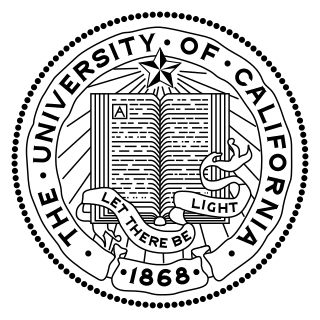
The University of California (UC) is a public land-grant research university system in the U.S. state of California. Headquartered in Oakland, the system is composed of its ten campuses at Berkeley, Davis, Irvine, Los Angeles, Merced, Riverside, San Diego, San Francisco, Santa Barbara, and Santa Cruz, along with numerous research centers and academic abroad centers. The system is the state's land-grant university. Major publications generally rank most UC campuses as being among the best universities in the world. In 1900, UC was one of the founders of the Association of American Universities and since the 1970s seven of its campuses, in addition to Berkeley, have been admitted to the association. Berkeley, Davis, Santa Cruz, Irvine, Los Angeles, Santa Barbara, and San Diego are considered Public Ivies, making California the state with the most universities in the nation to hold the title. UC campuses have large numbers of distinguished faculty in almost every academic discipline, with UC faculty and researchers having won 71 Nobel Prizes as of 2021.

The University of California, Berkeley, is a public land-grant research university in Berkeley, California. It was established in 1868 as the University of California and is the state's first land-grant university and the founding campus of the University of California system. Berkeley has been regarded to be among the top universities worldwide.

The University of California, Davis, is a public land-grant research university near Davis, California. Named a Public Ivy, it is the northernmost of the ten campuses of the University of California system. The institution was first founded as an agricultural branch of the system in 1905 and became the seventh campus of the University of California in 1959.

The University of California, San Diego, is a public land-grant research university in San Diego, California. Established in 1960 near the pre-existing Scripps Institution of Oceanography, UC San Diego is the southernmost of the ten campuses of the University of California, and offers over 200 undergraduate and graduate degree programs, enrolling 33,096 undergraduate and 9,872 graduate students. The university occupies 2,178 acres (881 ha) near the coast of the Pacific Ocean, with the main campus resting on approximately 1,152 acres (466 ha).

The California State University is a public university system in California, and the largest public university system in the world. It consists of 23 campuses and 7 off-campus centers, which together enroll 457,992 students and employ 56,256 faculty and staff members. In California, it is one of the three public higher education systems, along with the University of California and the California Community Colleges systems. The CSU system is officially incorporated as The Trustees of the California State University, and is headquartered in Long Beach, California.

Chang-lin Tien was a Chinese-American professor of mechanical engineering and university administrator. He was the seventh chancellor of the University of California, Berkeley (1990–1997), and in that capacity was the first person of Asian descent to head a major research university in the United States.

The University of California, Riverside is a public land-grant research university in Riverside, California. It is one of the ten campuses of the University of California system. The main campus sits on 1,900 acres (769 ha) in a suburban district of Riverside with a branch campus of 20 acres (8 ha) in Palm Desert. In 1907, the predecessor to UCR was founded as the UC Citrus Experiment Station, Riverside which pioneered research in biological pest control and the use of growth regulators.
The Walter A. Haas School of Business, also known as Berkeley Haas, is the business school of the University of California, Berkeley, a public research university in Berkeley, California. It was the first business school at a public university in the United States and is ranked among the best business schools in the world by The Economist, Financial Times, QS World University Rankings, U.S. News & World Report, and Bloomberg Businessweek.

Clark Kerr was an American economist and academic administrator. He was the first chancellor of the University of California, Berkeley, and twelfth president of the University of California.
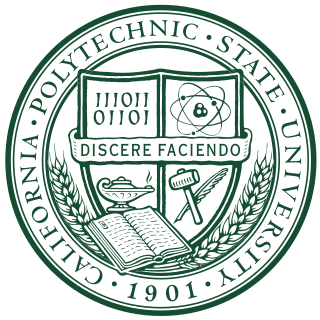
California Polytechnic State University, San Luis Obispo is a public university in San Luis Obispo County, adjacent to the city of San Luis Obispo. It is the oldest of three polytechnics in the California State University system.

Bowles Hall is a coed residential college at the University of California, Berkeley, known for its unique traditions, parties, and camaraderie. Designed by George W. Kelham, the building was the first residence hall on campus, dedicated in 1929, and was California's first state-owned residence hall. It was built in 1928 with a $350,000 grant from Mary McNear Bowles in memory of her husband, Berkeley alumnus and University of California Regent Phillip E. Bowles. Mr. Bowles was said to have three loves: horses, horticulture and the University of California.

The University House is a residence and venue for official events on the campus of the University of California, Berkeley. Designed by the architect Albert Pissis and completed in 1911, it was formerly named President's House while it served as the home of the president of the University of California, starting with Benjamin Ide Wheeler and ending with Robert Gordon Sproul. Since 1965, it has been the home of the Chancellor of the Berkeley campus.

Revelle College is the oldest residential college at the University of California, San Diego in La Jolla, California. Founded in 1964, it is named after oceanographer and UC San Diego founder Roger Revelle. UC San Diego—along with Revelle College—was founded at the height of the Space Race between the United States and the Soviet Union. As a result, the initial class of 181 undergraduates comprised only 30 non-science majors. Revelle College focuses on developing "a well-rounded student who is intellectually skilled and prepared for competition in a complex world."
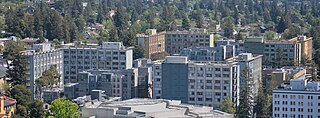
Housing at the University of California, Berkeley, includes student housing facilities run by the office of Residential and Student Service Programs (RSSP). Housing is also offered by off-campus entities such as fraternities and sororities and the Berkeley Student Cooperative (BSC).
The campus of the University of California, Berkeley, and its surrounding community are home to a number of notable buildings by early 20th-century campus architect John Galen Howard, his peer Bernard Maybeck, and their colleague Julia Morgan. Subsequent tenures as supervising architect held by George W. Kelham and Arthur Brown, Jr. saw the addition of several buildings in neoclassical and other revival styles, while the building boom after World War II introduced modernist buildings by architects such as Vernon DeMars, Joseph Esherick, John Carl Warnecke, Gardner Dailey, Anshen & Allen, and Skidmore, Owings and Merrill. Recent decades have seen additions including the postmodernist Haas School of Business by Charles Willard Moore, Soda Hall by Edward Larrabee Barnes, and the East Asian Library by Tod Williams Billie Tsien Architects.
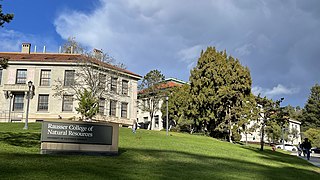
The Rausser College of Natural Resources (RCNR), or Rausser College, is the oldest college at the University of California, Berkeley and in the University of California system. Established in 1868 as the College of Agriculture under the federal Morrill Land-Grant Acts, CNR is the first state-run agricultural experiment station. The college is home to four internationally top-ranked academic departments: Agriculture and Resource Economics; Environmental Science, Policy, and Management; Nutritional Sciences and Toxicology; and Plant and Microbial Biology, and one interdisciplinary program, Energy and Resources Group. Since February 2020, it is named after former dean and distinguished professor emeritus Gordon Rausser after his landmark $50 million naming gift to the college.

Nicholas B. Dirks is an American academic and the former Chancellor of the University of California, Berkeley. Dirks is the author of numerous books on South Asian history and culture, primarily concerned with the impact of British colonial rule. In June 2020, Dirks was named president and CEO of The New York Academy of Sciences.

The School of Social Welfare of the University of California, Berkeley, was established June 1, 1944 and is located in Haviland Hall on the UC Berkeley campus. Its focus is to prepare graduates to become agents of social change through direct practice, agency management, policymaking, and leading new discoveries that address the grand challenges confronting society. Berkeley Social Welfare offers the Bachelor of Arts in Social Welfare through the College of Letters and Science (L&S), the M.S.W., and the Ph.D. Haviland Hall includes its own library, The Social Research Library, which was founded in 1957 and contains approximately 34,400 volumes and 200 active serial titles. The library originally housed volumes specifically for the social work field and expanded in 2014 to include education, psychology, public policy. The library also maintains an Indigenous Social Work space.
The history of the University of California, Berkeley begins on October 13, 1849, with the adoption of the Constitution of California, which provided for the creation of a public university. On Charter Day, March 23, 1868, the signing of the Organic Act established the University of California, with the new institution inheriting the land and facilities of the private College of California and the federal funding eligibility of a public agricultural, mining, and mechanical arts college.
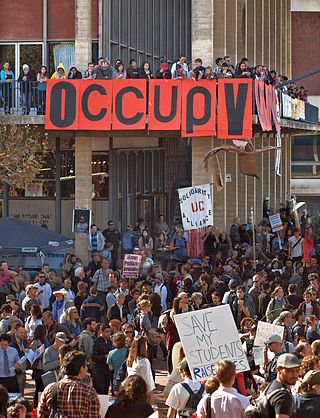
Occupy Cal included a series of demonstrations that began on November 9, 2011, on the University of California, Berkeley campus in Berkeley, California. It was allied with the Occupy Wall Street movement in New York City, San Francisco Bay Area Occupy groups such as Occupy Oakland, Occupy Berkeley, and Occupy San Francisco, and other public California universities. "Cal" in the name "Occupy Cal" is the nickname of the Berkeley campus and generally refers specifically to UC Berkeley.
References
- ↑ Noel Gallagher "New faculty-in-residence program launched" , UC Berkeley News, 8/25/2005
- ↑ Cathy Cockrell "The Teacher is In" , Letter Home: A Newsletter for Cal Parents, Spring 2001
- ↑ Cathy Cockrell "The Teacher is In" , Letter Home: A Newsletter for Cal Parents, Spring 2001
- ↑ "Resident Faculty Program" , UC Berkeley Residential and Student Services Program
- ↑ Noel Gallagher "New faculty-in-residence program launched" , UC Berkeley News, 8/25/2005
- ↑ Noel Gallagher "New faculty-in-residence program launched" , UC Berkeley News, 8/25/2005
- ↑ Bonnie Azab Powell "The secret lives of faculty, part 1: Scuba diving, dressage, ballroom dancing, and more" , UC Berkeley News, 7/28/2004